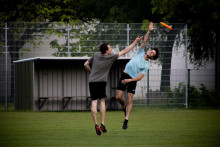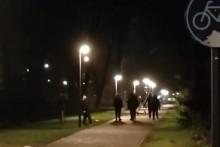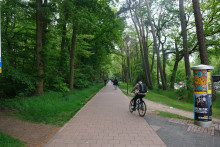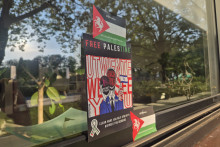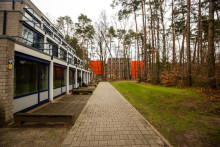To some students, the idea arose of making an association out of their favourite Sunday game: ultimate frisbee. In ultimate frisbee, two teams of seven players each try to bring the frisbee to the other side of the field: the endzone. It is a non-contact sport, and the person who possesses the frisbee is not allowed to move. This makes strategic positioning and tactical play very important.
Anand Nateshan, chairman of the Air Nomads, mentions that the idea to start an association emerged when a group of friends played frisbee games on campus every Sunday and more and more people joined. ‘Many of them were interested in getting better at the game instead of just playing it, which made us realise that we could establish an official association.’ More and more people joined the WhatsApp group and currently it consists of around 70 people. Each Wednesday and Friday they train in the evenings at 18:00, at respectively the UTrack and the baseball field.
Nateshan: ‘For the winter, we try to arrange an indoor location.’ Approximately ten people show up per training. At each training the last part consists of playing matches, in which they mix up the teams. On Sundays, they still play some matches. ‘We are planning on organising tournaments and we want to participate in tournaments of other frisbee associations in the Netherlands’, says Nateshan. In the future, they are even planning on organising workshops for other associations, to introduce people to their favourite game.
Roundnet, you may have never heard of it, but this game, also called Spikeball is gaining popularity in the Netherlands. In roundnet, two teams of two players try to hit a ball in a small trampoline-like net. After a serve in the net, the opposing team is allowed to hit the ball up to three times after which it should bounce in the net again. Players may use any part of their body. When the ball hits the net twice, or does not hit the net at all, the other team gets a point. The first team to reach eleven points wins the game.
Michelle Sudjito, secretary, and treasurer of LEAP, tells that her group of friends decided to establish a new association for one of their favourite hobbies. ‘We decide to call it LEAP, which means quick movement. It also means a group of leopards, so a logo was easily made.’ Each Wednesday they train on campus, behind the hockey field, from 18:00 to 20:00. The WhatsApp group for interested students already has 60 members. During the training, some exercises are done to practice with serving or quick movement, after which most of the training is filled with real matches in alternating teams. They are planning on organising two days per week: one day of training and one day of internal competition. Other activities like drinks in the sports canteen or going to the beach are also planned, and participation in the Dutch roundnet championship is on the schedule too.

Klonkieball? Yes, some students founded an association to play this game, better known as flunkyball played with Klok beer (a cheap beer brand from the Grolsch brewery, which is popular among students). Klonkieball is a game played by two teams who position themselves on opposite sides of a field. Each team throws a ball or shoe at a bottle in the middle of the field. In case they hit it, they must drink their drinks, placed in front of them, while the other team repositions the bottle as fast as possible. After repositioning, players must stop drinking. The first team to finish their drinks is the winner.
Lika Bonzi, internal and external affairs of De Klocus, tells us that the game fits perfect in times of a corona pandemic: ‘In March we noticed that this game allows you to have fun while keeping one and a half meters distance.’ Quickly, many people got interested. In October, already 90 people joined, while the Instagram page got over 300 followers. ‘We noticed that there is no standard set of rules for playing Klonkieball. We want to bring this game to a next level by creating these rules and organising large tournaments’, says Bonzi.
Each month, they organise a training where they practice the elements of the game. For example, they train their throwing techniques and their skills on downing a drink. However, members initially do not play with an alcoholic drink but can decide themselves what drink to bring. They are planning to play an internal competition with a ranking system, to see which team is the best at Klonkieball. Bonzi: ‘We have the ambition to become the largest association at the UT.’

By performing bodyweight exercises, calisthenics distinguishes itself from other fitness forms. At the outdoor fitness, next to the UTrack, a group of enthusiasts gather every Tuesday and Friday to practice their skills and improve their stamina. It started small, says Liran Neta, chairman of CalZquad. ‘It started in August 2020 with some friends after which a small community arose. Currently, we are with 30 people of which fifteen are active.’ The focus is on the community. ‘The association is centred around calisthenics, but the community is a way where people from different backgrounds meet’, says Neta.
Because of the cold, trainings are currently indoor. On Tuesdays they train at 19:00, on Fridays at 18:00. Sometimes, they also train outside on Sundays. Trainings exist of rounds with several exercises which each cover a different aspect of the body. Upper body, lower body, stamina, cardio: everything is covered. Neta: ‘Everybody can join and people from different levels train together and help each other.’ They noticed that several sports associations are focusing a lot on the technical skills of playing their sport, but not on stamina and strength training. ‘We think we could help these associations by filling the gap’, says Neta. Besides the calisthenics workouts, they also plan other activities. A party is on the schedule, as well as a pizza night.



